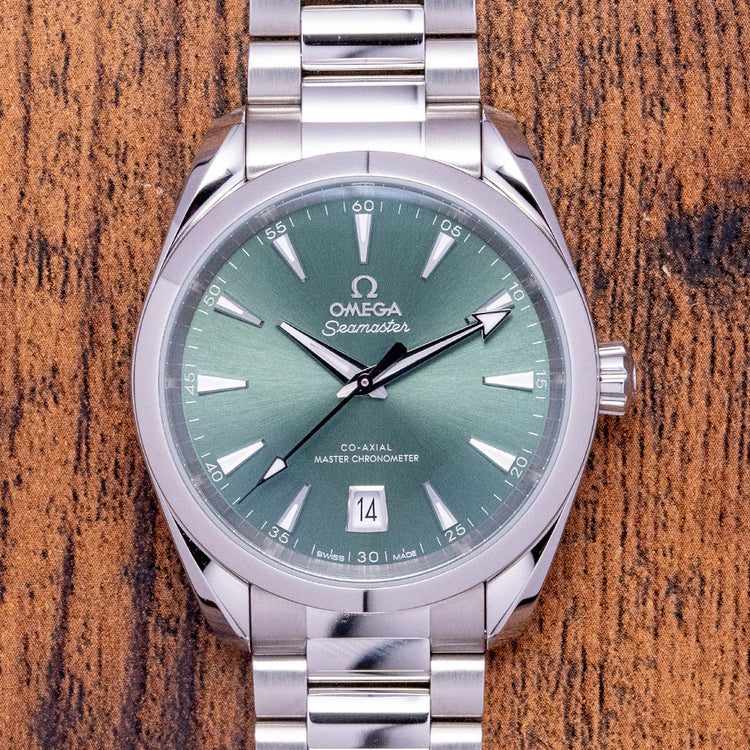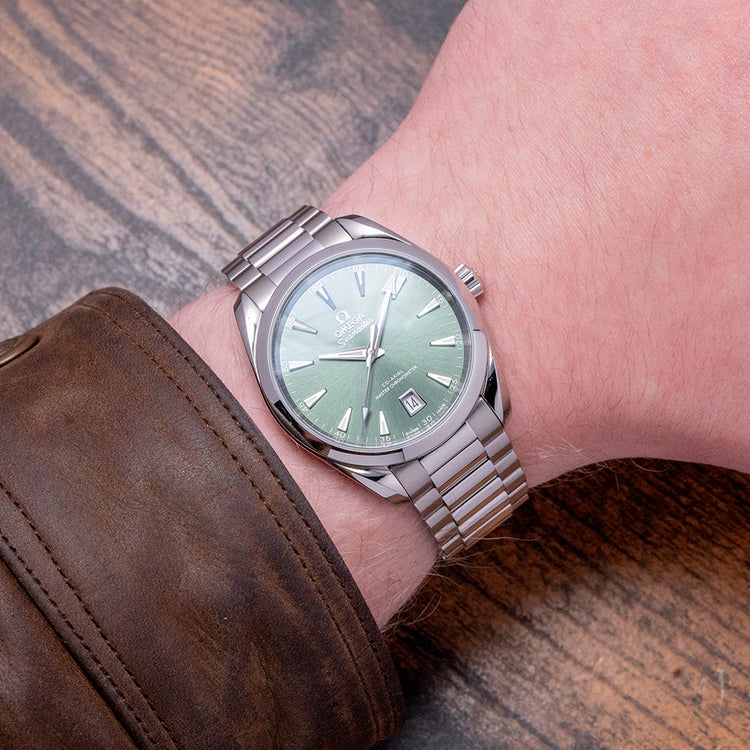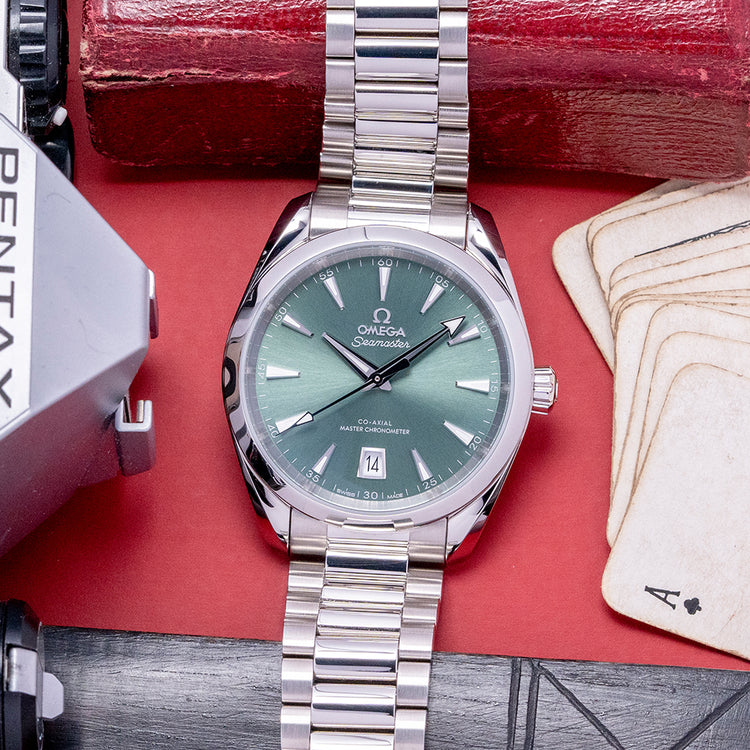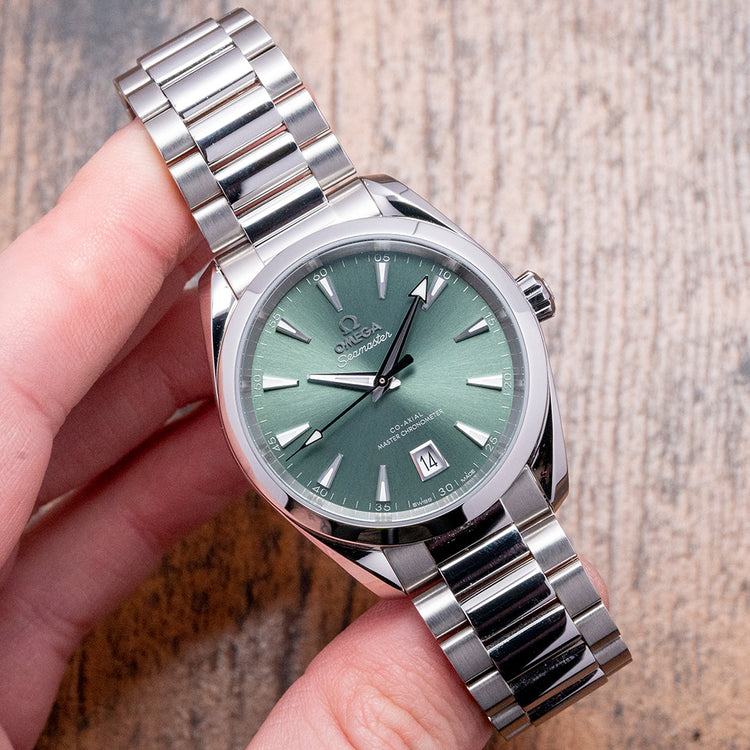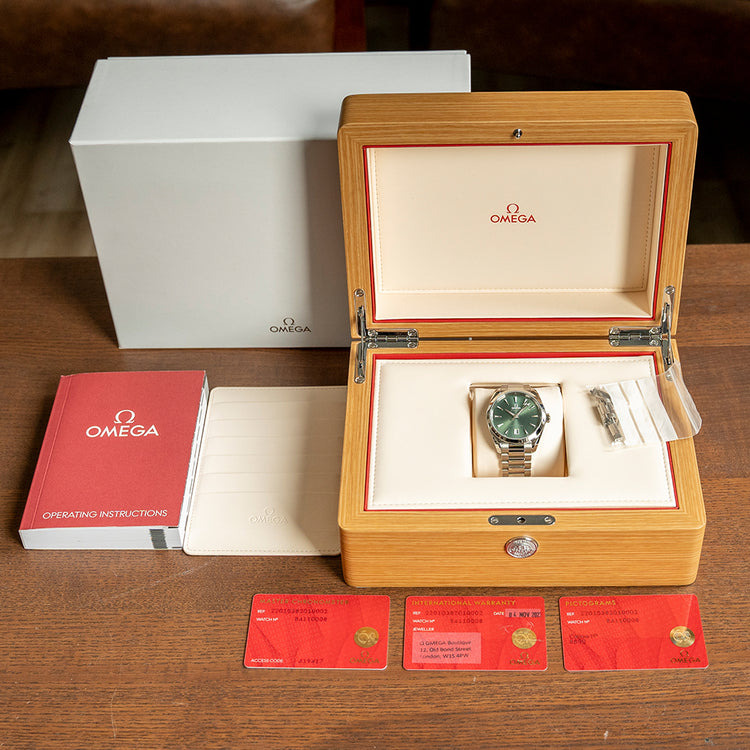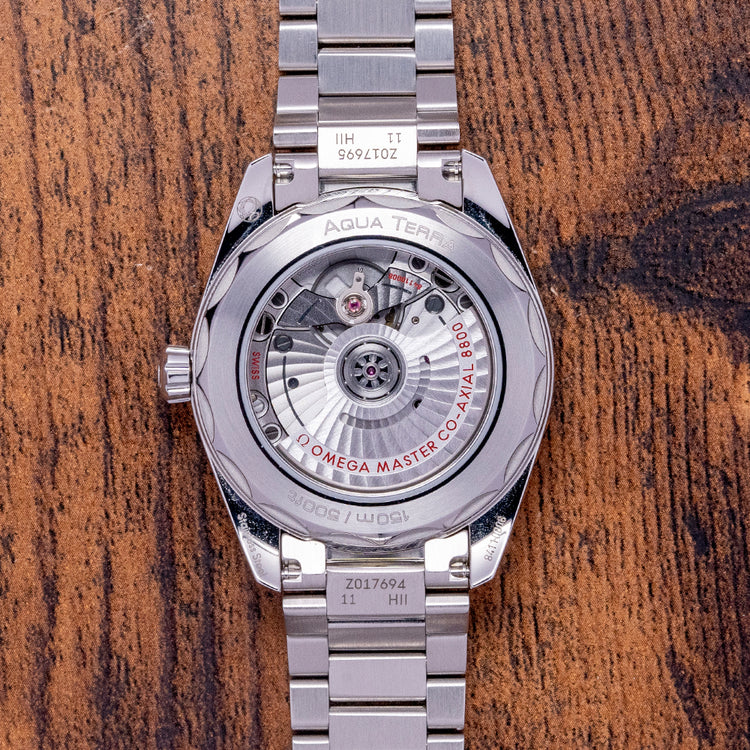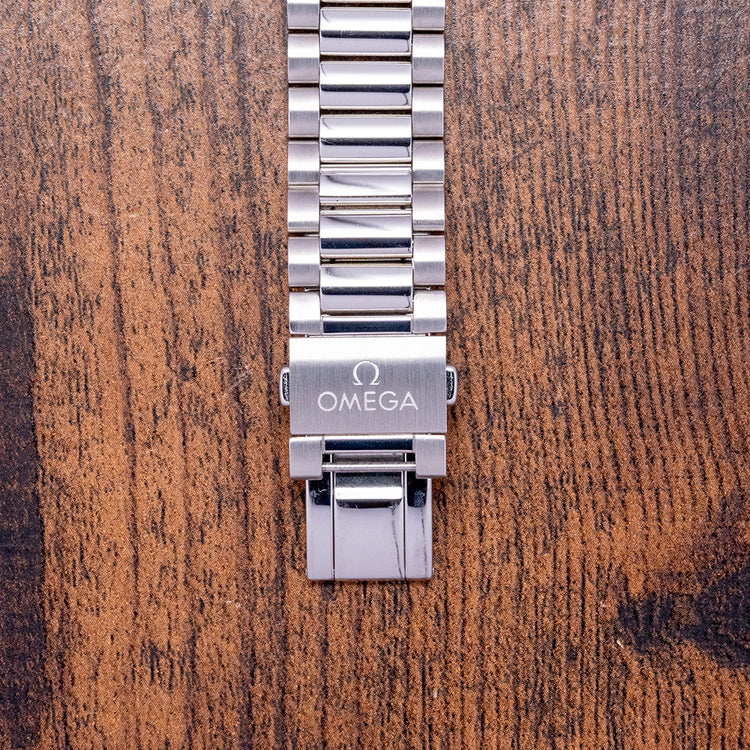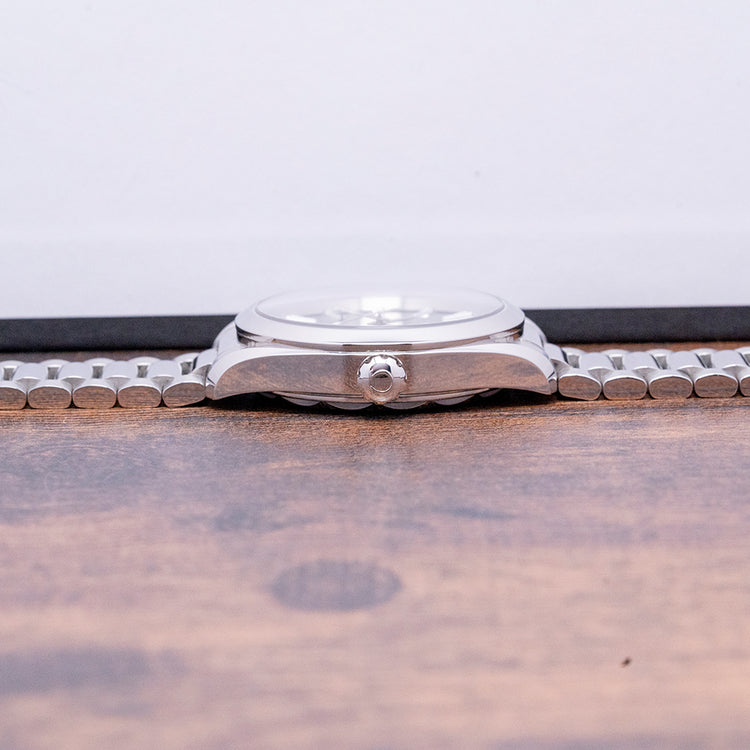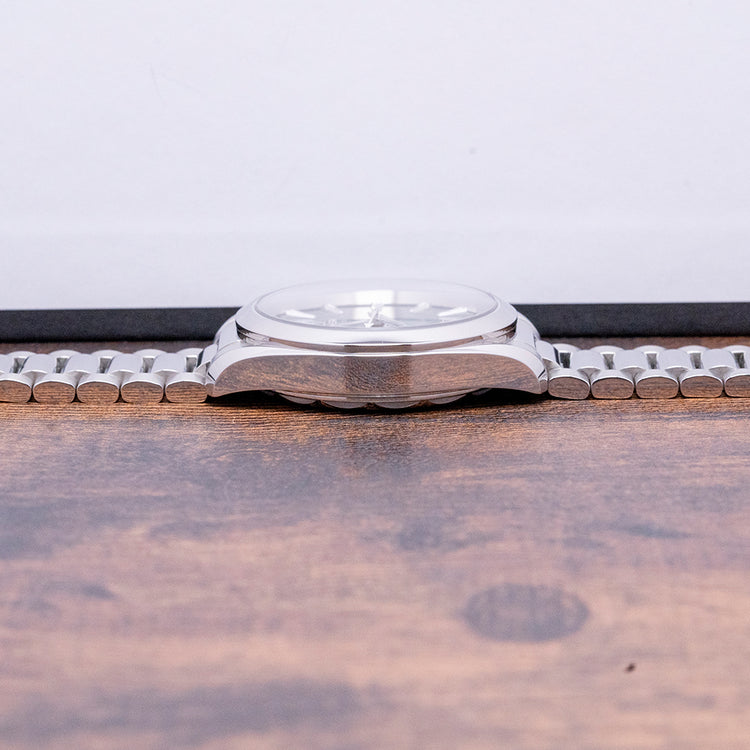More Information
Description
More
Less
The Watch
Here, we have a 2022 Omega Seamaster Aqua Terra Co-Axial 220.13.41.21.03.002 with a 38mm brushed and polished stainless steel symmetrical case, the case curves over your wrist with the characteristic twisted lugs, and a lug-to-lug length of 45mm and a case thickness of 12.5mm give the watch an impressive wrist presence. The Aqua Terra family was launched in 2002, and in 2017, we saw this improved version launched at Baselworld. The Shade's collection reflects the transitional hues and colours found in the world's oceans. On the right side is a signed screw-down crown that sits slightly recessed. The polished smooth bezel holds a flat sapphire crystal AR coated on both sides above a bay green dial made from brass, then lacquered and sunburst brushed. An outer minute chapter ring has small Arabic numerals with white numerals surrounding applied arrow point indexes that catch the light beautifully, coated in SuperLumiNova, marking the hours. At 6 o’clock, we have a framed date window. Rhodium-plated Arrow hands filled with SuperLumiNova complemented by a sweeping second hand with an arrow point filled with luminance. Text is precisely applied with the Omega motif "Seamaster'' at 12 o’clock and “Co-Axial Master Chronometer” at 6 o’clock. On the reverse is a screw-down exhibition sapphire case back with a wave pattern outer edge; inside an automatic Omega Cal. 8800, 35 jewels, 25,200 beats per hour, certified by the Swiss Federal Institute of Metrology (METAS), the watch goes through COSC certification before being selected for the eight tests run by METAS, this in-house movement is Chronometer Certified with a bi-directional rotor which reduces winding time and a Co-Axial Escapement, two barrels in series for excellent stability and durability and a silicon balance spring providing the movement resistance to magnetic fields of over 15,000 Gauss, decorated with Cotes de Geneve. The watch comes paired with its Omega 20mm polished and brushed stainless steel bracelet secured with an Omega-signed push-button deployment clasp, all links are provided, and the watch comes with its Omega presentation box, swing tag and papers.
Points of Mention
This watch is sold with its original Omega presentation box, swing tag, and original paperwork. It comes paired with its Omega 20mm polished and brushed stainless steel bracelet secured with an Omega-signed push-button deployment clasp; all links are provided. The watch is from November 2023 and is in fantastic condition, as you can see. The watch comes with its Manufacturer's Warranty.
For more photos see here - https://drive.google.com/drive/folders/1R5fGSTXEPuL93yZ6gaBACBtYAJmmRgIO?usp=drive_link
4K YouTube video, skip to 4:49 - https://youtu.be/TgD3xLhak-M
Personal Note
When this new Aqua Terra Shades series was announced I wasn't particularly impressed with the stock photos, they often made the dials look far too bright and washed out. But in person, this is far from the case and the dial is dynamic and beautiful, although difficult to capture with a camera. This is one I would highly recommend booking an appointment to see for yourself, but be warned, you will likely walk out with it on your wrist and a big smile on your face!
Specification
Lugs : 19mm
Condition : Pre-Owned
Box & Papers : Box & Papers
Case Material : Stainless Steel
Warranty : Manufacturer's Warranty
The Brand
They were formerly known as the La Generale Watch Co., founded in 1848 by Louis Brandt in La Chaux-de-Fonds. When he died in 1879, his sons carried on his dream. In 1880, they moved to 96 Rue Jakob-Stampfli, where they remain today. The brothers produced their first mass-produced calibre, the Labrador In 1885. Just a few years later, in 1892, they produced the first minute-repeater. In 1903, they renamed the company Omega until 1982, when they officially changed their name to Omega SA. During WW1, Omega watches were used as official timekeepers for the Royal Flying Corps and the US Army. In 1930, Omega and Tissot merged together to form Société Suisse pour l'Industrie Horlogère (SSIH). In 1931, another group was formed - Allgemeine Schweizerische Uhrenindustrie AG (ASUAG). Where SSIH was primarily French-speaking, ASUAG was founded by the more German-speaking members of the Swiss watch industry. In 1948, they introduced the first edition of one of its most symbolic watches: the Seamaster. Omega first introduced the Constellation in 1952. At the time, it was Omega's flagship timepiece. The first models had a Cal. 354 bumper movement in them. Later, in 1955, Omega introduced the Automatic Cal. 50x, followed in 1959 by the Cal.55x (no date) and 56x (date) versions. Many of the Constellations came with pie-pan dials, diamond indexes, and fancy lug configurations. All the gold Constellations of that time have the Observatory of Geneva's hand engraved on the back. The stainless steel and stainless steel/gold versions had a gold medallion on the back with the Observatory of Geneva. The eight stars above the Observatory stand for the many exploits of Omega in the world Chronometer competition. Celebrating the fact that all Constellations are Chronometer Certified. In 1962, when astronaut Wally Schirra wore a Speedmaster on his Mercury Sigma 7 Mission, making it the first Omega watch to enter space. After rigorous tests, NASA used Omega for all their Apollo missions, including the 1969 Moon landing of Apollo 11. Today, Omega is still the first choice of astronauts. In 1969, President Nixon famously said it was “too valuable” and turned down the first-ever all-gold Speedmaster Professional Deluxe. As a response to the ever-growing threat of electronic watches to the manufacturers of mechanical watches, Omega and many Swiss brands such as Rolex and Patek Philippe formed Centre Electronique Horologer (CEH). Prototypes began to appear in 1967, and their production started in 1968. Then, In 1972, Omega introduced the reference 198.030, which included the Omega calibre 1250, a ‘tuning-fork electronic movement which was made under licence from Bulova. Later we saw a merger of SSIH and ASUAG into SMH, or Société de Microélectronique et d’Horlogerie. This merger took place in 1983. In 1992, the company acquired Blancpain, and in 1998, it officially rebranded itself from SMH to the Swatch Group. Then, in 1999, they purchased and integrated Breguet into the Swatch Group.
Points of Mention
More
Less
Personal Note
More
Less
Specification
More
Less
Movement : Automatic Omega Cal. 8800
Age : November 2023
Year : 2023
Case Size : 38mm
Case Thickness : 12.5mm
Lug to Lug : 45mm
Lugs : 19mm
Condition : Pre-Owned
Case Material : Stainless Steel
The wrist model's wrist size is 7inch
About Omega
More
Less
Description
The Watch
Here, we have a 2022 Omega Seamaster Aqua Terra Co-Axial 220.13.41.21.03.002 with a 38mm brushed and polished stainless steel symmetrical case, the case curves over your wrist with the characteristic twisted lugs, and a lug-to-lug length of 45mm and a case thickness of 12.5mm give the watch an impressive wrist presence. The Aqua Terra family was launched in 2002, and in 2017, we saw this improved version launched at Baselworld. The Shade's collection reflects the transitional hues and colours found in the world's oceans. On the right side is a signed screw-down crown that sits slightly recessed. The polished smooth bezel holds a flat sapphire crystal AR coated on both sides above a bay green dial made from brass, then lacquered and sunburst brushed. An outer minute chapter ring has small Arabic numerals with white numerals surrounding applied arrow point indexes that catch the light beautifully, coated in SuperLumiNova, marking the hours. At 6 o’clock, we have a framed date window. Rhodium-plated Arrow hands filled with SuperLumiNova complemented by a sweeping second hand with an arrow point filled with luminance. Text is precisely applied with the Omega motif "Seamaster'' at 12 o’clock and “Co-Axial Master Chronometer” at 6 o’clock. On the reverse is a screw-down exhibition sapphire case back with a wave pattern outer edge; inside an automatic Omega Cal. 8800, 35 jewels, 25,200 beats per hour, certified by the Swiss Federal Institute of Metrology (METAS), the watch goes through COSC certification before being selected for the eight tests run by METAS, this in-house movement is Chronometer Certified with a bi-directional rotor which reduces winding time and a Co-Axial Escapement, two barrels in series for excellent stability and durability and a silicon balance spring providing the movement resistance to magnetic fields of over 15,000 Gauss, decorated with Cotes de Geneve. The watch comes paired with its Omega 20mm polished and brushed stainless steel bracelet secured with an Omega-signed push-button deployment clasp, all links are provided, and the watch comes with its Omega presentation box, swing tag and papers.
Points of Mention
This watch is sold with its original Omega presentation box, swing tag, and original paperwork. It comes paired with its Omega 20mm polished and brushed stainless steel bracelet secured with an Omega-signed push-button deployment clasp; all links are provided. The watch is from November 2023 and is in fantastic condition, as you can see. The watch comes with its Manufacturer's Warranty.
For more photos see here - https://drive.google.com/drive/folders/1R5fGSTXEPuL93yZ6gaBACBtYAJmmRgIO?usp=drive_link
4K YouTube video, skip to 4:49 - https://youtu.be/TgD3xLhak-M
Personal Note
When this new Aqua Terra Shades series was announced I wasn't particularly impressed with the stock photos, they often made the dials look far too bright and washed out. But in person, this is far from the case and the dial is dynamic and beautiful, although difficult to capture with a camera. This is one I would highly recommend booking an appointment to see for yourself, but be warned, you will likely walk out with it on your wrist and a big smile on your face!
Specification
Lugs : 19mm
Condition : Pre-Owned
Box & Papers : Box & Papers
Case Material : Stainless Steel
Warranty : Manufacturer's Warranty
The Brand
They were formerly known as the La Generale Watch Co., founded in 1848 by Louis Brandt in La Chaux-de-Fonds. When he died in 1879, his sons carried on his dream. In 1880, they moved to 96 Rue Jakob-Stampfli, where they remain today. The brothers produced their first mass-produced calibre, the Labrador In 1885. Just a few years later, in 1892, they produced the first minute-repeater. In 1903, they renamed the company Omega until 1982, when they officially changed their name to Omega SA. During WW1, Omega watches were used as official timekeepers for the Royal Flying Corps and the US Army. In 1930, Omega and Tissot merged together to form Société Suisse pour l'Industrie Horlogère (SSIH). In 1931, another group was formed - Allgemeine Schweizerische Uhrenindustrie AG (ASUAG). Where SSIH was primarily French-speaking, ASUAG was founded by the more German-speaking members of the Swiss watch industry. In 1948, they introduced the first edition of one of its most symbolic watches: the Seamaster. Omega first introduced the Constellation in 1952. At the time, it was Omega's flagship timepiece. The first models had a Cal. 354 bumper movement in them. Later, in 1955, Omega introduced the Automatic Cal. 50x, followed in 1959 by the Cal.55x (no date) and 56x (date) versions. Many of the Constellations came with pie-pan dials, diamond indexes, and fancy lug configurations. All the gold Constellations of that time have the Observatory of Geneva's hand engraved on the back. The stainless steel and stainless steel/gold versions had a gold medallion on the back with the Observatory of Geneva. The eight stars above the Observatory stand for the many exploits of Omega in the world Chronometer competition. Celebrating the fact that all Constellations are Chronometer Certified. In 1962, when astronaut Wally Schirra wore a Speedmaster on his Mercury Sigma 7 Mission, making it the first Omega watch to enter space. After rigorous tests, NASA used Omega for all their Apollo missions, including the 1969 Moon landing of Apollo 11. Today, Omega is still the first choice of astronauts. In 1969, President Nixon famously said it was “too valuable” and turned down the first-ever all-gold Speedmaster Professional Deluxe. As a response to the ever-growing threat of electronic watches to the manufacturers of mechanical watches, Omega and many Swiss brands such as Rolex and Patek Philippe formed Centre Electronique Horologer (CEH). Prototypes began to appear in 1967, and their production started in 1968. Then, In 1972, Omega introduced the reference 198.030, which included the Omega calibre 1250, a ‘tuning-fork electronic movement which was made under licence from Bulova. Later we saw a merger of SSIH and ASUAG into SMH, or Société de Microélectronique et d’Horlogerie. This merger took place in 1983. In 1992, the company acquired Blancpain, and in 1998, it officially rebranded itself from SMH to the Swatch Group. Then, in 1999, they purchased and integrated Breguet into the Swatch Group.
Points of Mention
Personal Note
Specification
The Brand
Enquire or Book an Appointment
Would you like to discover further details about this watch, or perhaps arrange an appointment to view and try it on? Complete this form and a member of our team will get back to you shortly.
You May Also Like




















